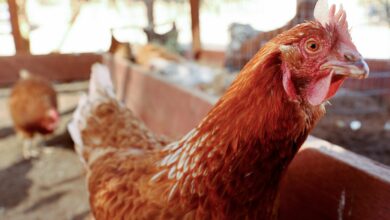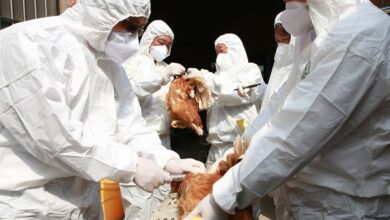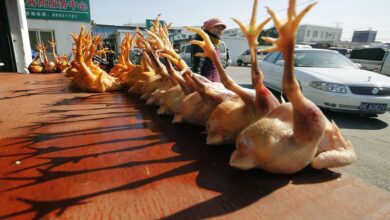
An Egyptian woman died of bird flu on Monday in the Assiut University Hospital, bringing the death toll from the avian flu to 65, since it first emerged in the country in 2006.
Her daughter, who had also contracted the virus, fled from the Assiut Chest Hospital when she heard of her mother's death, according to Al-Masry Al-Youm.
The paper quoted Dr. Ahmed Abdel Hamid, undersecretary of the Health Ministry of in Assiut, as saying that Ragia, a housewife, was the first case to die of bird flu in Assiut. Two additional confirmed cases of human infection with bird flu virus A/H5N1, bringing the total number of human infections in Egypt this year to six cases.
The Egyptian Ministry of Health also announced another infection of a three-year-old child from Minya, Upper Egypt, after being exposed to dead birds at his house. According to a statement by the Health Ministry, the child is receiving treatment at Minya Fever Hospital and is in good health.
Ragia became the 65th Egyptian who died of the deadly H5N1 virus, since the outbreak of the epidemic. The death rate reached 36 percent of the 179 people caught bird flu in Egypt, compared to 55 percent on the international level, mostly in China.
Around two million workers involved in the poultry industry and eight million people of their relatives have been harmed since the emergence of bird flu in Egypt, according to the State Information Service.
The World Health Organization published a report in 2014 on influenza A (H5) activity from 18 February to 23 September 2014. The report mentioned that the infections of the A (H5) reported to the WHO by Egypt included poultry and humans.
Another WHO report published on 2 October 2014 mentioned that 175 people had died due to infection with avian influenza, the A (H7N9) virus.
WHO advised that travelers to countries with known outbreaks of avian influenza should avoid poultry farms, or contact with animals in live bird markets, or entering areas where poultry may be slaughtered, or contact with any surfaces that appear to be contaminated with feces from poultry or other animals. Travelers should also wash their hands often with soap and water. Travelers should follow standard food safety and hygiene practices.




